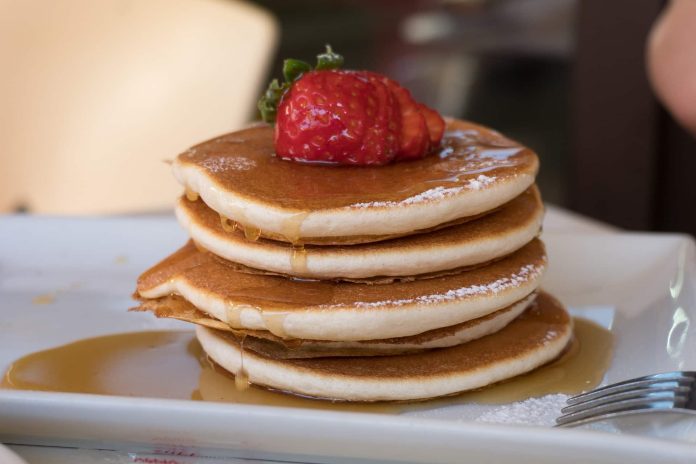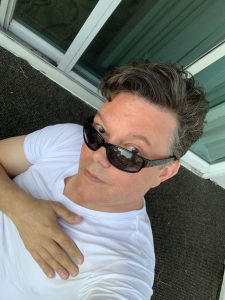The morning after my father announced he and Mom were getting divorced, he made everyone strawberry pancakes for breakfast because it was the sweetest apology he could muster. Afterward, my brother Brian and I went out back and hit golf balls into the woods. One swing and the balls lifted into the trees, gone. Over the summer, Brian and I caddied at a swank country club and scrounged up almost a bucket’s worth of balls. Working them down to a handful, I took a sloppy hack and my ball caromed off the chicken shack and into the mixed elms and birches. I frowned; even at 10-years-old, the metaphor of a jettisoned ball and my father’s imminent departure was not lost on me.
At that point in our lives, we didn’t have much to remedy our parents’ fracture: there was no extended family in the area, we didn’t belong to afterschool clubs or organizations, and we certainly didn’t attend church: one of the reasons we’d moved downstate, besides a job opportunity for my dad, was to escape our Pentecostal church. They were straight up Old Testament fanboys who believed in demonic possession and speaking in tongues. During service, the pastor would step over the bodies of those “overcome” by the spirit of the Lord. They’d be lying on the floor, eyes closed and blissed out, and he’d carry on with his sermon about how to be a good Christian in an ungrateful world. Then he’d flip his mike cord and high step over the pronounced girth of some lady snoozing it off near the podium. “Praise Jesus”, he’d say, and continue on with his motivational speech as if walking over the prone bodies of zonked adults was all perfectly normal.
But I digress.
It would be another month before my dad was fully moved out, but Brian and I found solace in the backyard, the small woods behind it. So did my younger brother, Josh. My little sister Liz was an afterthought, and she mostly stayed inside, not because she wanted to but because we three ignored her. Brothers are cruel like that. The backyard became our go-to, our refuge in a time of complete uncertainty. Out back, we were the ones in charge.
In the center of the yard was an overgrown grape vine. We ate some of the fruit but were grossed out by their abundance of seeds. So instead, we whipped them at each other in impromptu battles, splotching our shirts like blood.
Once, the two boys across the street that used to pummel Brian and me for sport came over and the four of us pretended to make wine, crushing the grapes and filling an empty soda bottle with the run-off. We drank it and acted like what we thought drunk people acted like, which was to giggle and walk in circles. We’d later learn at various neighborhood blowouts that drunk people mostly complained loudly about each other, air guitared to Iron Maiden, and threw up in the rhododendrons. But that was still a few years away. Sensibly, my mom decided to make jam with the grapes and that was probably the smartest thing anyone did with them.
Alone after school, we rummaged through the basement to find curious odds and ends, stuff both there when we moved in and items our father hadn’t taken with him: spooky chemicals in ancient brown bottles lined the shelves in one corner, along with crooked boxes filled with European history books, maps, old clothes, and sword and sorcery paperbacks. We also discovered our dad’s record collection. He used to be a disc jockey, and we admired the colorful copies of folk and rock artists none of us had heard of: The Who, Bob Dylan, The Kingston Trio. One box held these odd, extra thick albums with no covers at all. The artists were old blues and jazz musicians, and today, I’m sure these records would be worth the price of tuition at an elite college. We were duly unimpressed. And since they were made by a bunch of guys who were probably dead anyway, we figured the records would be perfect for a lively discus competition.
At first, we hucked the albums toward the trees, but they didn’t fly straight and kept smashing sideways into the ground. So we threw them straight up in the air and ran away as they hurtled back towards us. We agreed to add a marksman category, and after one of us tossed an album, another took aim with a pellet gun. Our aim wasn’t half bad. And we took safety very seriously, pointing the gun away from most windows and sometimes each other.
The dimensions of the backyard were just right for Wiffle ball and we declared it our own Fenway Park. Brian and I grew up watching the Red Sox on Channel 38 with our parents. I watched Carlton Fisk wave the ball fair in the ‘75 Series and suffered the humiliation of Bucky-Bleeping-Dent in ‘78. In the backyard, I was Yaz, and the chicken shack served as a kind of Green Monster. Even the grape vine was in play, like the outfield ivy at Wrigley Field in Chicago. Nothing was better than smacking the ball into the grapes as one of us frantically tried to dig it out, wild eyed and cursing. Many a single was stretched into a double courtesy of that vine.
We decided to best way to utilize the woods was by setting up animal snares we read about in one of the books we hauled out of the basement. We bent the necks of saplings down and used carrots as bait. We’d check the snares faithfully each day, but to our disappointment, no rabbits. Not even an unlucky squirrel.
On my birthday, my friend Jamie and I blew up a can of Renuzit air freshener in a makeshift campfire in the woods. We had hoped for fireworks and got it: the can rocketing up about 20 feet. Afterward, Jamie and I put the campfire out with sand and went over to his house to shoot hoops. I was excited as my dad was going to be home that night to help me celebrate turning 11.
Later, as I made my way back home, I kept hearing sirens and noticed a small cloud of smoke hovering over my road, and then over the woods. The closer I got, the more I became filled with an increasing sense of doom.
I stood around with my brothers and sister in the backyard as a couple of firemen zipped this way and that. They came in through the backside of the woods and quickly contained the blaze. My father came right up to Brian and me, and for the first time in my life he looked scared.
“Do you boys know anything about this?” A fireman clad in yellow stood behind my dad, waiting.
Brian and I looked at each other and did the right thing: we lied.
“What? No. No way. I was over Jamie’s house,” I said. Which was technically true.
Brian denied culpability as well, even though he knew what Jamie and I were up to.
“Well, this is certainly one hell of a set of birthday candles,” my dad said, and walked back to the fireman, arms raised.
I should have felt guilty for lying, but I didn’t. Why ruin a perfectly good birthday with the enormity of truth? Truth, I thought, only spoke of painful things: that our dad was gone, that I could daily see the struggle of being a single parent in my mother’s eyes, that our family had very little money and even less reasons to be happy. Birthdays were supposed to be a once-a-year moratorium on all of that. I couldn’t sacrifice my brief window to joy.
Somehow, we all got through that mess. And as fall stretched to winter, and winter to spring, it became increasingly apparent that dad was never coming back, that this really was permanent. But we all did something extraordinary: we persevered.
As we got older, the yard morphed into a different kind of haven; our mother slowly cultivated it into a dazzling flower garden. She tore out the grape vine and almost every corner of the yard now billows with (nonlethal) explosions of pink, purple, white, and red. There is a small koi pond. Japanese maples. The chicken shack has been removed in favor of French lilac. Butterflies are the new rulers of this domain.
In fact, when her grown-up sons and daughter now come to visit, she takes them on tours to show them what she has added, points out what is thriving or what still remains stubborn to rise. I wonder at it all. And am amazed. Because I remember a time, however misguided, when the yard was overrun by those seeking their own path to blossom.
Christopher Locke was born in New Hampshire and received his MFA from Goddard College. His essays can be found in The Sun, The Rumpus, JMWW, Parents, Slice, Atticus Review, and elsewhere. His memoir “Without Saints” (Black Lawrence Press) and poetry collection “Music For Ghosts” (NYQ Books) are both due in 2022. Chris lives and writes in the Adirondacks. Chris can be found online here.
***
Statement on Black Lives Matter and support for social change.

